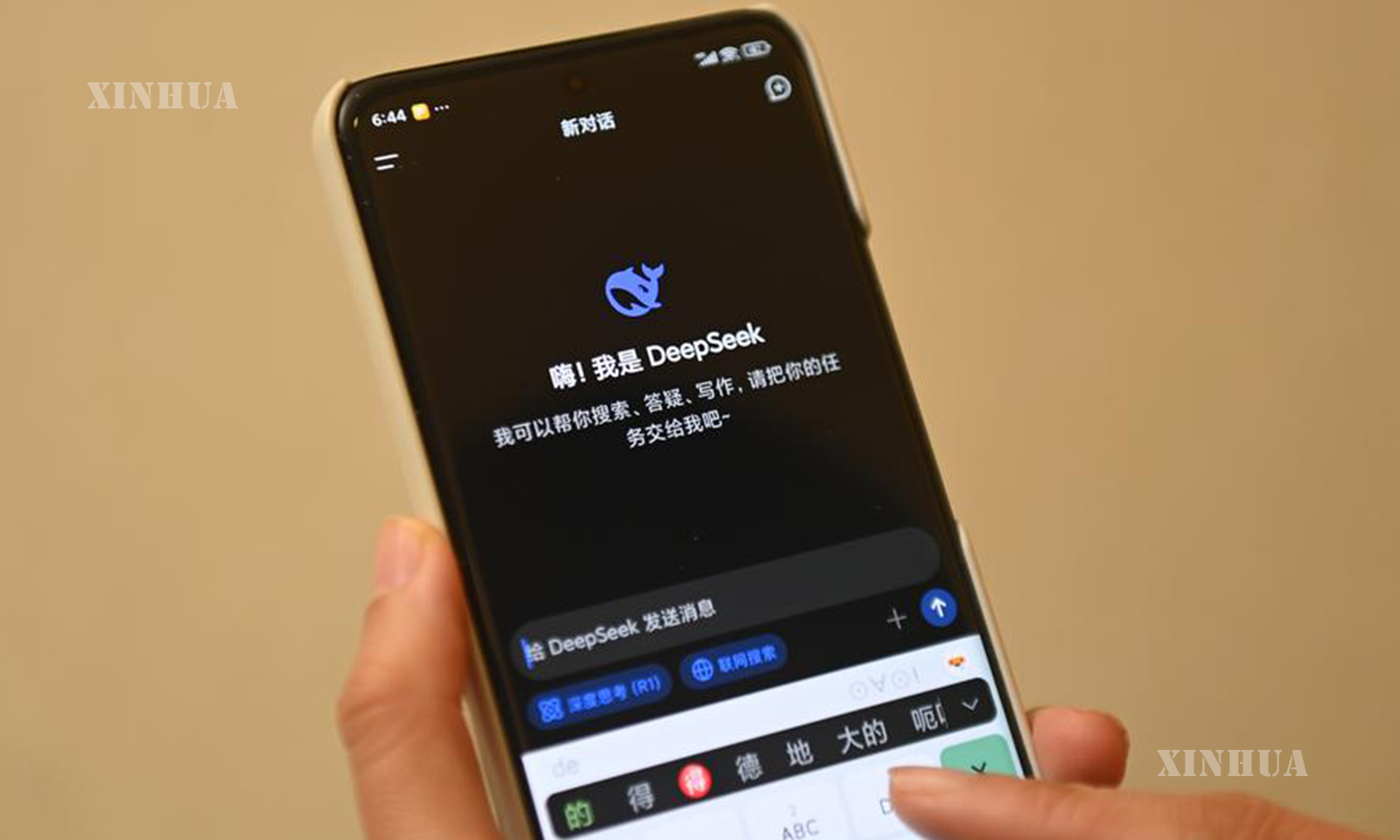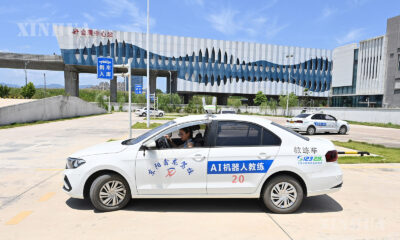Education & Health
မြန်မာလူငယ်များ အနာဂတ်ကို ပုံဖော်ရန် ဉာဏ်ရည်တု (AI) ကို အသုံးပြုလာ

ရန်ကုန်၊ ဇူလိုင် ၁၈ ရက် (ဆင်ဟွာ)
ယခုနှစ် ဇူလိုင် ၁၅ ရက်တွင် ကျရောက်သော ကမ္ဘာ့လူငယ်များစွမ်းရည်နေ့၏ ရည်ရွယ်ချက်အား “ဉာဏ်ရည်တု (AI) နည်းပညာနှင့် ဒစ်ဂျစ်တယ်စွမ်းရည်များမှတစ်ဆင့် လူငယ့်အားမာန်များ” ဟူ၍ ခေါင်းစဉ်ပေးထားပြီး မြန်မာနိုင်ငံရှိ လူငယ်များအတွက် များပြားလာသော အခွင့်အလမ်းများရော ရင်ဆိုင်ကြုံတွေ့နေရသည့် စိန်ခေါ်မှုများကိုပါ အလေးထားဖော်ပြလျက်ရှိသည်။“AI အသုံးပြုမှုက ကြီးပါတယ်။ AI ရဲ့ သက်ရောက်မှုကလည်း အရမ်းကိုကြီးမားပြီးတော့ ပိုပြီးကျယ်ကျယ်ပြန့်ပြန့်ရှိလာပါတယ်” ဟု AI ကြောင့် ဖြစ်ပေါ်လာသော ပြောင်းလဲမှုများအား အနီးကပ်လေ့လာစောင့်ကြည့်သူ၊ နိုင်ငံခြားဘာသာတက္ကသိုလ် (ရန်ကုန်) အငြိမ်းစားပါမောက္ခချုပ် ဒေါက်တာ ကြည်ရွှင်က ပြောခဲ့သည်။
“အခုဆိုရင် မြို့ပြရော နယ်ဘက်တွေကပါ AI အသုံးပြုလာကြတယ်” ဟု မကြာသေးမီအချိန်က မြန်မာနိုင်ငံ အရှေ့ပိုင်း ရှမ်းပြည်နယ်ရှိ လူငယ်ကျောင်းသားလေးများက DeepSeek ကဲ့သို့ AI ချက်ဘော့တ် (chatbots) အသုံးပြုကြသည်ကို တွေ့မြင်ခဲ့ရသည့် အတွေ့အကြုံများအား ပြန်လည်အောက်မေ့လျက် ဒေါက်တာ ကြည်ရွှင်က ပြောပြခဲ့သည်။
“ကျောင်းသားတွေက ဆရာ၊ ဆရာမတွေထက် AI ကို ပိုပြီး နှံ့နှံ့စပ်စပ် သုံးတတ်ကြတယ်” ဟု ၎င်းက ပြောပြခဲ့သလို AI အသုံးပြုမှု အရှိန်မြင့်တက်လာသည့် တစ်ချိန်တည်းမှာပင် စည်းကမ်းထိန်းသိမ်းရေးအနေဖြင့်မူ သတ်သတ်မှတ်မှတ်မရှိသေးသည်ကိုလည်း သတိပေးထောက်ပြခဲ့သည်။
“ပညာရေးအဖွဲ့အစည်းတွေမှာလည်း AI ရဲ့ သက်ရောက်မှုက ဆရာ၊ ဆရာမတွေ၊ ဝန်ထမ်းတွေနဲ့ ကျောင်းသားကျောင်းသူတွေ၊ အလွှာစုံတိုင်းမှာ သက်ရောက်မှုရှိလာပြီ။ ကျွန်တော်တို့လို administrator တောင်မှ အရင်လို ပြဿနာတွေကို ဘယ်လိုနည်းလမ်းသုံးရမလဲဆိုတာကို သေသေချာချာမလုပ်တော့ဘဲ AI အပေါ် မှီခိုတာတွေ များလာကို ဆန်းစစ်မိတယ်။ ကျောင်းသားကျောင်းသူတွေအနေနဲ့ AI အပေါ် မှီခိုတာတွေ များလာတဲ့အခါမှာ လေ့လာဆန်းစစ်မှု စွမ်းရည်တွေ၊ critical thinking စွမ်းရည်တွေအပေါ် ထိခိုက်လာနိုင်တယ်” ဟု ဒေါက်တာ ကြည်ရွှင်က ရှင်းပြခဲ့သည်။
“AI က secondary research လိုမျိုးကို ကောင်းကောင်းလုပ်ပေးနိုင်တယ်။ ဒါပေမဲ့ လူတွေကြားထဲ လက်တွေ့သုတေသနမျိုးတွေကိုတော့ မလုပ်ပေးနိုင်ဘူးပေါ့။ AI က အမြဲတမ်းမှန်နေတာတော့မဟုတ်ဘူး။ ဘက်လိုက်မှုတွေလည်း ရှိနိုင်တယ်။ သူက အသုံးပြုတစ်ဦးချင်းစီရဲ့ အခြေအနေတွေကို နားမလည်နိုင် မသိနိုင်ဘူးလေ။ ဒါကြောင့် တချို့ အဖြေတွေကတော့ ကိုက်ညီဆီလျော်မှုရှိမှာမဟုတ်ဘူး” ဟု ၎င်းက ဆိုသည်။
“AI ကို မေးခွန်းတွေရဲ့ အဖြေမြန်မြန်ထုတ်ပေးရုံလောက်ပဲ အသုံးပြုနေမယ်ဆိုရင်တော့ အဲဒီလိုလူတွေဟာ နောက်ငါးနှစ် ဆယ်နှစ်လောက်မှာဆို နောက်ကျကျန်နေခဲ့မှာပဲ။ ဒါပေမဲ့ ဒါကို သုံးနေရင်းနဲ့ ကျွန်တော်တို့ရဲ့ critical thinking ပိုင်းနဲ့ ပြဿနာအဖြေရှာစွမ်းရည်ပိုင်းတွေ လိုက်ပြီးမြင့်တက်အောင်လုပ်နိုင်မယ်ဆိုရင်တော့ AI နဲ့အတူ ကျွန်တော်တို့လည်း တိုးတက်မှုရှိနိုင်မှာ ဖြစ်ပါတယ်” ဟု ဒေါက်တာ ကြည်ရွှင်က ၎င်း၏ အမြင်ကို ဖြည့်စွက်ပြောပြခဲ့ပြီး အချို့ ဝန်ကြီးဌာနများနှင့် စာသင်ကျောင်းများက AI ဆိုင်ရာ မူဝါဒများကို လုပ်ကိုင်ဆောင်ရွက်နေပြီ ဖြစ်ကြောင်း ဖြည့်စွက်ပြောကြားခဲ့သည်။
မြန်မာနိုင်ငံ မဟာဗျူဟာနှင့် နိုင်ငံတကာလေ့လာရေးအဖွဲ့ (Myanmar – ISIS) မှ သုတေသီတစ်ဦးဖြစ်သော မအေးမာဝေက မြန်မာနိုင်ငံရှိ လူငယ်များအနေဖြင့် AI ရိုးရိုးရှင်းရှင်းအသုံးပြုခြင်းထက် ကျော်လွန်ကာ ဖန်တီးသူများ ဖြစ်လာရမည်ဟု ဆိုသည်။ “အခုဆို ကျွန်မတို့ အဆင့်မြင့် AI သုံးချင်တယ်ဆိုရင် အခကြေးငွေပေးရတယ်။ ဒါကို ကျွန်မတို့အနေနဲ့ တီထွင်နိုင်မယ်ဆိုရင်တော့ ကျွန်မတို့အတွက် ပိုပြီးကောင်းတာပေါ့” ဟု ၎င်းက ပြောကြားခဲ့သည်။
အားကစားနှင့် လူငယ်ရေးရာဝန်ကြီးဌာနအောက်ရှိ လူငယ်ရေးရာဦးစီးဌာန လက်ထောက်ညွှန်ကြားရေးမှူး ဦးအောင်အောင်မျိုးက ဦးစီးဌာနအနေဖြင့် တက္ကသိုလ်များတွင် AI ဆိုင်ရာ ဆွေးနွေးပွဲများ၊ နှီးနှောဖလှယ်ပွဲများနှင့် သင်ကြားရေးအစီအစဉ်များနှင့် ဒစ်ဂျစ်တယ်စွမ်းရည်များ စီစဉ်ဆောင်ရွက်ပေးလျက်ရှိကြောင်း ပြောကြားခဲ့သည်။
တရားဝင်လေ့ကျင့်သင်ကြားမှုများအတွက် အကန့်အသတ်ရှိနေသော်ငြားလည်း လူငယ်များစွာကမူ အွန်လိုင်းအရင်းအမြစ်များမှတစ်ဆင့် code ရေးသားခြင်းနှင့် AI အကြောင်း သင်ယူလေ့လာခြင်းများအတွက် ကိုယ်တိုင်ကိုယ်ကျလုပ်ဆောင်နေကြပြီဖြစ်သည်။
လူငယ်အချို့ကလည်း ဒစ်ဂျစ်တယ်ကမ္ဘာနှင့် ရင်ပေါင်တန်းနိုင်ရေးအတွက် ကြိုးပမ်းဆောင်ရွက်လျက်ရှိသည်။ ရန်ကုန်မြို့တွင် နေထိုင်သူ အသက် ၃၁ နှစ်အရွယ် ကိုအေးမင်းသူက “အခု ကျွန်တော်တို့က AI ခေတ်မှာရောက်နေတာပါ။ AI က လူတွေအတွက်ရော အဖွဲ့အစည်းတွေအတွက်ပါ မရှိမဖြစ် ဖြစ်လာပြီ။ ကျွန်တော်လည်း ခေတ်နောက်ကျမကျန်ရလေအောင်လို့ လွန်ခဲ့တဲ့လအနည်းငယ်လောက်ကမှ programming language ကို စပြီး လေ့လာဖို့ ဆုံးဖြတ်ခဲ့တာပါ” ဟု ၎င်း၏ အတွေ့အကြုံကို ပြောပြခဲ့သည်။
၎င်းအနေဖြင့် လအနည်းငယ်ချီတုံချတုံဖြစ်ခဲ့ပြီးနောက် automation နှင့် machine အား လေ့လာရာတွင် ရိုးရှင်း၍ အသုံးပြုရလွယ်ကူပြီး အသုံးတွင်ကျယ်နေသော Python ကို စတင်လေ့လာရန် ဆုံးဖြတ်ချက်ချခဲ့သည်။ “ဘာမှမရှိတာထက်စာရင် တစ်ခုခုရှိတာပိုကောင်းတာပေါ့။ အခုဆိုရင် ကျွန်တော် Python ကို သုံးပြီးတော့ ဂဏန်းပေါင်းစက် နမူနာလေးတွေ လုပ်နိုင်လာပြီ။ ပြီးတော့ drawing chart တွေ ဘားဂရပ်တွေလိုမျိုး လုပ်ဆောင်ချက်တွေ ဖန်တီးလုပ်ဆောင်နိုင်ပါပြီ” ဟု ကိုအေးမင်းသူက ဆိုသည်။
ကိုအေးမင်းသူက Python အွန်လိုင်းသင်ခန်းစာအား စာရင်းသွင်းတက်ရောက်ခဲ့ကာ ၎င်း၏ လေ့လာသင်ယူမှုကို အထောက်အကူပြုလမ်းညွှန်ပေးနိုင်ရန် ChatGPT နှင့် Microsoft Copilot ကဲ့သို့ ပလက်ဖောင်းများအား အသုံးပြုခဲ့ကြောင်း သိရသည်။ “ကျွန်တော် အခက်တွေ့နေပြီဆိုရင် ချက်ဘော့တ်ကို တိုက်ရိုက်မေးလိုက်တယ်။ အဲဒါက တော်တော်လေး အထောက်အကူဖြစ်ပါတယ်” ဟု ၎င်းက ဆိုသည်။
“အခုတလော မြန်မာကျောင်းသားတွေအတွက် coding သင်ခန်းစာတွေကို အွန်လိုင်းကနေ အများကြီးပေးထားတာ ကျွန်တော် သတိထားမိတယ်” ဟု ၎င်းက ထပ်လောင်းပြောကြားခဲ့သည်။
ကိုအေးမင်းသူ အပါအဝင် မြန်မာနိုင်ငံတစ်ဝန်းရှိ မြောက်မြားလှစွာသော လူငယ်လူရွယ်များအတွက်မူ AI ဆိုသည်မှာ ရေပန်းစားလှသည့် စကားလုံးတစ်ရပ်သာမဟုတ်တော့ဘဲ ၎င်းတို့အသီးသီး၏ အနာဂတ်များစွာအတွက် အခွင့်အလမ်း၊ ဖန်တီးမှုနှင့် ထိန်းချုပ်ပဲ့ကိုင်ပေးမည့် လမ်းကြောင်းတစ်ရပ်ပင်ဖြစ်ပေသည်။ (Xinhua)
……………………………………..
(English Version)
Feature: Myanmar youth embrace AI to shape future
YANGON, July 15 (Xinhua) — As the world observed World Youth Skills Day on Tuesday, this year’s theme, “Youth Empowerment Through Artificial Intelligence (AI) and Digital Skills,” highlighted both the growing opportunities and challenges facing young people in Myanmar.
“The use of AI is growing,” said Kyi Shwin, a retired rector of Yangon University of Foreign Languages who closely follows the changes brought by AI, adding that the impact of AI is significant and far-reaching.
“It is now used by both people from urban and rural areas,” he said, recalling how he recently met young boys in Shan state, eastern Myanmar, using Myanmar-language AI chatbots like DeepSeek.
“Students are more friendly with technology, more students than teachers are using AI,” he said, warning that while AI adoption is accelerating, regulation has not kept pace.
“For educational institutions, AI affects every level, teachers, staff, and students. Even administrators like us aren’t thinking through problems the way we used to. We’ve become reliant on AI. That can hurt students’ analytical and critical thinking skills.”
“AI can handle secondary research, but it cannot do firsthand research among people,” he said. “AI is not always accurate. Sometimes it’s biased. It doesn’t understand users’ individual situations. So, some answers may be inappropriate.”
“If AI is only used to get quick answers, those users will fall behind in the next five to ten years. But if we keep our critical thinking and problem-solving skills while using it, we can progress alongside AI,” he added, noting that some ministries and schools are working on AI policies.
Ma Aye Mar Way, a researcher at Myanmar Institute of Strategic and International Studies, said that Myanmar’s youth must go beyond simply using AI. They should become creators. “If we want to use advanced AI, we now have to pay for it. If we can build it ourselves, it’s better for us.”
U Aung Aung Myo, assistant director at the Department of Youth Affairs under the Ministry of Sports and Youth Affairs, said the department is organizing talks, seminars, and training programs on AI and digital skills at universities.
However, with limited access to formal training, many young people are teaching themselves to code and learning about AI through online resources.
Some are taking the initiative to keep pace with the digital world. In Yangon, 31-year-old Aye Min Thu said, “We are now in the age of AI. It has become essential for people and organizations. I didn’t want to be left behind, so I decided to start learning a programming language a few months ago.”
After months of indecision, he took the plunge, starting with Python, which is simple, accessible, and widely used in automation and machine learning. “I figured something is better than nothing,” he said. “Now, I can build simple calculators and perform tasks like drawing charts and bar graphs using Python.”
He’s also enrolled in online Python courses and used platforms like ChatGPT and Microsoft Copilot to guide his learning. “When I get stuck, I ask the chatbot directly. It helps a lot,” he said.
“Recently, I also noticed that many coding courses are being offered online for Myanmar students,” he added.
For Aye Min Thu, and thousands of young people across Myanmar, AI isn’t just a buzzword. It’s a path toward opportunity, creativity, and control over their futures.
Photo: A person uses DeepSeek app on a mobile phone on Feb. 17, 2025. (Xinhua/Huang Zongzhi)






